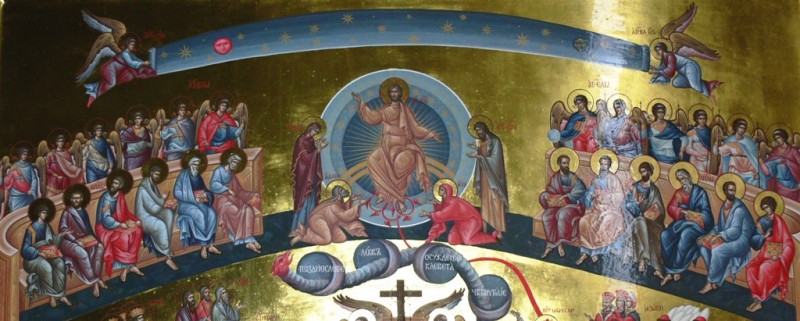Human death is one of those experiences that we prefer to avoid if at all possible. We have been conditioned to avoid the discussion of death even with the dying! We shun looking at the dead in their natural state before the mortician’s art has done all that is possible to make the dead resemble the living. Even in death, we prefer to hold celebrations of life rather than confront the harsh reality of our earthly existence coming to a halting end. While this is a common approach in modern society, it doesn’t reflect the beliefs we profess in the Creed.
Death is painful. It hurts and it hurts deeply. Is there a greater personal sadness than the death of a mother, a father, a son, a daughter, a brother, a sister, a bosom friend, or a spouse? At such moments, don’t the words of Saint John of Damascus ring especially true, “What earthly sweetness remains unmixed with grief? All things are but shadows, most feeble, but most deluding dreams: yet one moment only and death shall supplant them all”? It is hard to look at death, and yet this article of the Creed—“I look for the resurrection of the dead”—enables us to do so, softening our inconsolable sadness into a patient hopefulness through the light of Christ’s countenance and the sweetness of His beauty, as the Saint concludes the selfsame hymn.
The verb in this article, to look for, (προσοδῶ) can also be rendered as “I expect,” which is in turn composed of the prefix (πρός) for movement towards something and another verb (δοκάω) meaning to accept graciously. Hence, in this article, it is as though we are saying that we expect the resurrection of the dead, moving towards it and welcoming it with all our heart. This expectation should have a blessed influence on our lives. After all, expectations about the future are known to affect thought, emotion, and behavior in the present especially when there is expectation of a concrete goal of value in the future. In this case, it is the resurrection of the dead unto life with Christ, which has an infinite value and which according to expectancy theory should be infinitely motivating.
The resurrection of the dead moreover assures that there will be a continuity between our life now and our life with God then. Hence, as Christians we are to live in accord with that continuity that leads us, body and soul, to the very bosom of God. The resurrection of the dead further provides a consistency to our deepest beliefs. Thus, Saint John of Damascus writes, “If there is no resurrection, let us eat and drink: let us pursue a life of pleasure and enjoyment. If there is no resurrection, how do we differ from the irrational beasts? If there is no resurrection, let us hold the wild beasts of the field happy who have a life free from sorrow. If there is no resurrection, neither is there any God nor Providence, but all things are driven and borne along of themselves” (An Exact Expression of the Orthodox Faith, Book 4, chapter 27). But there is the resurrection of the dead! We expect it. And in expecting it, we live lives of Christian virtue assured of God’s presence and comforted by His providence.
The Creed reminds us each time we profess it that death is not the end. This human existence on earth necessarily draws to a close so that a beautiful and rich eternal life can dawn. Our human condition is short-sighted in that it abhors any thoughts of death. Yet, the faith we profess when we say the Nicene Creed is always looking forward beyond death to the resurrection of the dead, which for the faithful is for a life with God and in God. The resurrection of the dead is part of a greater mystery, the Person of Christ, the Godman, Who contains the entire Adam, all of humanity, in His humanity and has risen victoriously from the dead, so that we might have life everlasting and so that our mortal bodies that will one day die will also one day be raised through His might as He Himself declared: “Marvel not at this: for the hour is coming, in the which all that are in the graves shall hear His voice, and shall come forth; they that have done good, unto the resurrection of life; and they that have done evil, unto the resurrection of damnation.” (John 5:28-29)
Our life here and now should be a preparation and expectation for the resurrection of the dead that we hope will be unto life eternal with God. One of the slogans from Alcoholics Anonymous is particularly appropriate—“Wear the world as a loose garment”—meaning we should never attach our desires or affections to the things of our earthly life. We should live with the resurrection of the dead as a given, which means that we will ultimately stand before Christ, face to face.
If “gracious acceptance” characterizes the attitude of the watchful Christian, there is no need for fear no anxiety concerning death, for a new life is awaiting us. The words of Elder Paisios are particularly illuminating: “The most important thing is for man to grasp this most profound meaning of life, which is the salvation of the soul. When man believes in God and in the future life, then he understands the vanity of this present life and prepares his passport for the other life. We forget that all of us will leave this life. None of us are going to put down roots here. This present life…is meant for us to be tested and to pass over into the future, eternal life. Our goal here must be to prepare ourselves so we can depart with our conscience at ease when God calls us close to Him.” (Spiritual Awakening)
If the words, “I look for the resurrection of the dead,” would only become rooted deep in our souls and orient us in our approach to life. No funeral would be a final farewell. No mishap nor tragedy could deprive us of faith in God’s providence. No enticement could distract us from the aim of having our resurrection from the dead be a resurrection unto life forever with Christ. Like Saint Paul, we would exclaim “neither death, nor life, nor angels, nor principalities, nor powers, nor things present, nor things to come, nor height, nor depth, nor any other creature, shall be able to separate us from the love of God, which is in Christ Jesus our Lord” (Romans 8:38-39). All of this will imbue our lives with an unquenchable hope and an unfaltering optimism, for we are assured by our Lord Himself through the voice of the Apostle Paul that “eye hath not seen, nor ear heard, neither have entered into the heart of man, the things which God hath prepared for them that love him” (1 Corinthians 2:9). That is what it means to expect the resurrection of the dead.
Source: Ancient Christian Wisdom




















